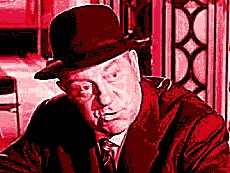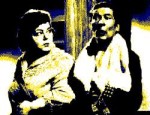Film Review

Gilles Grangier may not have been up to the standard of Jean Delannoy (one of the pillars of French quality cinema in the 1940s and '50s), but he was generally well-regarded by the industry and had a knack of turning out technically well-crafted crowdpleasers over several decades. His previous excursions into policier territory - Gas-oil (1955) and Le Désordre et la nuit (1958), both with Gabin excelling in the lead role - are highly thought of and are considered by some as exemplary examples of French film noir. Not long afterwards, Gabin and Grangier notched up a popular success with their gangster parody Le Cave se rebiffe (1961), now considered a classic in the comédie policière line Maigret voit rouge, by contrast, is one of Grangier's weaker offerings, an all-too-complacent rehash of policier themes jumbled together in a horribly formulaic scenario that is as lacking in logic as it is in credibility and originality.
The weakness of the script is amplified by Grangier's apparent inability (or unwillingness) to do anything with it other than churn out just another mediocre crime flick, and this no doubt accounts for Gabin's way below par performance and the equally unenthusiastic contributions from his more-than-capable supporting cast comprising Michel Constantin, Paul Frankeur and Guy Decomble - all fine actors totally wasted on this ramshackle production. The female presence provided by Françoise Fabian and Paulette Dubost is welcome, and if these two charismatic actresses had been given a little more screen time the film may have been slightly less indigestible. Alas, Grangier singularly fails to make the best of the resources at his disposal and so the film ends up as nothing more than a tediously sluggish pastiche of the most risible example of American film noir.
Deficient as Maigret voit rouge is (in just about every department), it still managed to attract a sizeable audience (of just over two million spectators) at the French box office on its first release - which is probably more a sign of the enduring popularity of Jean Gabin and the Maigret brand. The critics were mostly unimpressed by the film but it did have some supporters. After seeing the film, Georges Simenon confided in an interview that he thought Gabin had done an 'amazing job' in the role of Maigret, and added: 'It bothers me a bit, because I'm only going to be able to see Maigret in Gabin's guise.' By this time, however, Gabin had had enough of the role and once filming was done he put down the famous pipe for good. The next actor to assume the part on screen was Heinz Rühmann, in the 1966 European co-production Maigret and His Greatest Case, followed by Gino Cervi in an Italian offering, Maigret a Pigalle, a year later. It would be over half a century before the pipe-smoking sleuth returned to French cinema screens, with Gérard Depardieu taking on the part (to some acclaim) in Patrice Leconte's Maigret (1922).
© James Travers 2023
The above content is owned by frenchfilms.org and must not be copied.
Film Synopsis
One night, a man is shot dead in the busy Pigalle district of Paris, apparently the victim of a drive-by killing. The sole witness to the crime is Inspector Lognon, who hurries away to notify the police. When the inspector returns a short while later, the body of the dead man has mysteriously disappeared, presumably taken away by his killers. Commissaire Maigret is promptly assigned to the case and it soon becomes apparent that the hitmen are American gangsters. He duly pays a visit to the American Embassy but is advised by a senior diplomat that he should drop the case immediately to avoid a political incident. Naturally for a committed upholder of the law who is more concerned with justice than politics this advice is like a red rag to a bull. Infuriated, Maigret is more determined than ever to get to the bottom of the case. The number plate of the car involved in the murder leads Lognon to a sleazy bar run by an American of Sicilian origin. It seems that the bar is a convenient hide-out for the city's hoodlums, as Lognon soon discovers to his cost. In the course of a long and hazardous investigation, Maigret gradually pieces together the reason for the unexplained shooting. It seems that two American gangs have decided to go to war in the French capital. The only question is: why?© James Travers
The above content is owned by frenchfilms.org and must not be copied.
Similar Films
Here are some other films you may enjoy watching:- In the Heat of the Night (1967)
- Pickpocket (1959)
- L'Affaire Dominici (1973)
- To Kill a Mockingbird (1962)
- Le Trou (1960)
Other related links:
Film Credits
- Director: Gilles Grangier
- Script: Gilles Grangier, Jacques Robert, Georges Simenon (novel)
- Cinematographer: Louis Page
- Music: Michel Legrand, Francis Lemarque
- Cast: Jean Gabin (Commissaire Jules Maigret), Françoise Fabian (Lily), Guy Decomble (Lognon), Roland Armontel (Dr Fezin), Paul Frankeur (Bonfils), Paul Carpenter (Harry Mc Donald), Edward Meeks (Bill Larner), Ricky Cooper (Charlie), Michel Constantin (Cicero), Roger Dutoit (Bidoine), Harry-Max (Curtis), Paulette Dubost (La patronne de l'hôtel), Laurence Badie (Lucienne), Marcel Bozzuffi (Torrence), Vittorio Sanipoli (Pozzo)
- Country: Italy / France
- Language: French
- Support: Black and White
- Runtime: 87 min
- Aka: Maigret Sees Red
The best of Japanese cinema

The Carry On films, from the heyday of British film comedy

The history of French cinema
